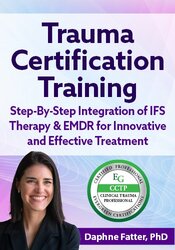Enrol in an online course today for flexible, self-paced learning—no fixed schedule required. Plus, enjoy lifetime access to course materials for convenient revisiting.
Rejecting Diet Culture in Clinical Work

Diet culture tells us that food restriction is the primary way to control eating and feel better about one’s body. Dieting is often viewed as a positive means of self-care as well as the route to happiness, success and self-esteem. However, there is zero evidence that any diet works in the long run for the vast majority of people. While virtually every diet leads to short-term weight loss, research shows that upwards of 95 per cent of people will gain back the lost pounds, and one to two-thirds will end up higher than their pre-diet weights. People who diet are eight times more likely to develop an eating disorder, have a higher risk for disease as the result of weight cycling, and have higher rates of depression and lower self-esteem. While dieting for weight loss may seem like good self-care, it is actually harmful to our clients’ physical and mental wellbeing.
As with our clients, diet culture will have shaped our own attitudes towards food, dieting and weight. Here are some essential principles to keep in mind when working with clients who struggle with emotional eating, chronic dieting, bingeing and body image.
Understanding Diet Failure
While just about every diet works in the short run, the physical and psychological deprivation they create almost always leads to overeating or bingeing on the ‘forbidden’ foods as people break through the restrictions. While this behavior is a natural reaction to deprivation, people typically feel great shame about their perceived lack of willpower and the weight regain that almost always follows.
You may hear clients say they are eliminating certain foods or food groups in the name of health or wellness. While eating foods that support one’s body is good self-care, when these changes are made in pursuit of weight loss they are a diet in disguise and subject to the same physical and psychological pitfalls as other diets. For example, we’ve seen an uptick of people giving up gluten when they have no medical reason to do so.
Reconnecting With Hunger Signals
As therapists, we’ve likely been trained to focus on the underlying causes of emotional eating. However, in order to truly make peace with food, it is essential that clients end the yo-yo diet cycle. Attuned eating, also known as intuitive eating, is the antidote to the diet mentality. Attuned eaters use their internal, physical cues for hunger and fullness to guide them as they choose from a wide variety of foods. Instead of deciding what to eat based on what is ‘good’ or ‘bad’, they learn to trust their bodies and understand that satisfaction is key.
As clients build a reliable internal structure to feed themselves, they are in a much stronger position to address the emotional aspects of their overeating. Not only is attuned eating compatible with the therapeutic goal of working toward reducing emotional overeating, it is the key to helping people become in charge of their eating (as opposed to being in control) as they heal underlying issues.
Promoting Wellness Beyond Weight
While clients may express their wish to lose weight, recovery from eating issues should not be based on body size. If mental health professionals focus on weight loss as a criterion for successful recovery, they put their clients at risk of feeling failure and shame in treatment if weight loss does not occur. As clients normalise eating and address other issues associated with overeating or binge behaviors, they may or may not lose weight. After all, weight is a characteristic, not a behavior.
It is important for therapists – as well as their clients – to understand myths about health and weight, the impact of weight stigma, and strategies to reject internalised weight stigma. The Health At Every Size® (HAES) framework encourages healthful behaviours on an individual level and addresses social justice issues on a societal level.
Examples of positive, sustainable behaviours that support physical and emotional health regardless of whether weight is lost include:
- Developing a healthy relationship with food (as opposed to eating only ‘healthy’ foods)
- Participating in enjoyable physical activity
- Getting a good night’s sleep
- Cultivating mindfulness practices
The HAES framework allows people to become empowered and to stay active in their self-care without feeling that they are somehow giving up.
It is crucial for clinicians to address their own biases regarding body size so that they don’t – even unintentionally – contribute to clients’ experiences of diet failure, shame and weight stigma. In our clinical work, as well as our personal lives, we can reject diet culture and help create a world that treats people of all shapes and sizes with respect.


















